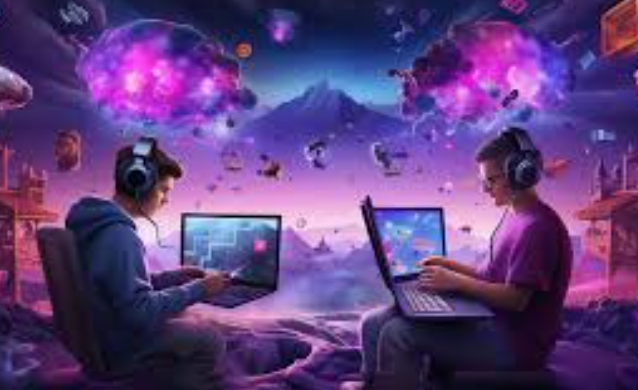Others
Online Gaming: The Digital Frontier of Entertainment, Community, and Innovation

Online slot gacor has dramatically reshaped the entertainment landscape over the past few decades, evolving from a niche hobby into a global cultural and economic powerhouse. Today, online games are not just a means of entertainment—they are vibrant, dynamic ecosystems that connect millions of players worldwide, drive technological innovations, and influence social trends. As gaming becomes more immersive and integrated into everyday life, it continues to foster global communities, challenge traditional notions of entertainment, and push the boundaries of what’s possible in digital spaces. This article explores the multifaceted impact of online gaming on society, the technology shaping its future, and the challenges that lie ahead.
The Evolution of Online Gaming: From Simple Multiplayer to Global Phenomenon
The history of online gaming began in the 1970s with rudimentary multiplayer experiences like Spacewar! and Pong, but it was the rise of the internet in the late 1990s and early 2000s that truly set the stage for its global domination. Early games like Quake, Doom, and Warcraft allowed players to connect over local area networks (LANs), but it was the advent of the World Wide Web and broadband internet that made truly global, seamless gaming a reality.
By the mid-2000s, massively multiplayer online role-playing games (MMORPGs) like World of Warcraft and EVE Online introduced immersive worlds where players could interact with each other in real-time. These early pioneers set the stage for the development of today’s most popular titles, such as Fortnite, League of Legends, and Apex Legends, which not only focus on gameplay but also on community-building and long-term engagement.
The shift to free-to-play (F2P) models, in which players can access games for free but make in-game purchases (microtransactions), has also been a transformative force. The success of games like Fortnite and League of Legends has made F2P the dominant business model for many online games, democratizing access and allowing millions of players around the world to experience high-quality gaming without a significant financial investment upfront.
The Social Impact of Online Gaming: Building Communities and Relationships
One of the most significant changes in the gaming world over the past decade is the shift from solitary play to connected, social experiences. Online gaming has evolved into a social activity where players not only compete but also form friendships, join communities, and share experiences that extend beyond the game itself.
Global Connectivity and Cross-Cultural Interaction
The ability to play games online with others across the globe has created unprecedented opportunities for cross-cultural interaction. Players from different countries and backgrounds now routinely team up or face off in virtual worlds, fostering new connections and broadening cultural horizons. For example, players of League of Legends often find themselves playing with or against opponents from other continents, using voice communication and teamwork to overcome the language barrier and collaborate towards a common goal.
Online games, especially multiplayer titles, have transformed into social platforms where people communicate, strategize, and form lasting relationships. Platforms like Discord, Twitch, and YouTube have allowed gamers to share their experiences with audiences worldwide, further embedding online gaming into the fabric of digital socializing. These platforms provide a virtual “space” for players to interact, whether it’s through live streaming, discussions, or gaming-related content.
Esports: Competitive Gaming as a Spectator Sport
Another powerful social aspect of online gaming is the rise of esports. What started as small, amateur competitions has evolved into a professional, multi-billion-dollar industry. Games like Dota 2, League of Legends, Counter-Strike: Global Offensive, and Overwatch now have dedicated professional leagues, international tournaments, and large fanbases. These esports events often draw audiences in the millions, with top-tier competitions streamed live across various platforms.
Esports has transformed competitive gaming into a spectator sport, with professional players now earning sponsorship deals, salaries, and fame akin to traditional athletes. Fans of esports follow their favorite teams, watch live streams of games, and celebrate victories in online forums. The success of esports has led to the creation of dedicated gaming arenas and even university scholarships for esports athletes, further solidifying gaming’s place in mainstream culture.
The Role of Gaming in Mental Health and Well-Being
While gaming has long been associated with entertainment, its social benefits are also increasingly recognized. Online gaming provides an outlet for players to escape stress, combat feelings of isolation, and bond with others, particularly in times of social distancing and lockdowns. The COVID-19 pandemic highlighted the importance of online gaming as a form of social connection when physical gatherings were restricted.
Games that focus on cooperation rather than competition, such as Animal Crossing: New Horizons or Minecraft, have become havens for players seeking refuge from the pressures of daily life. These games offer a space for creativity and collaboration, providing a sense of accomplishment and emotional well-being. Additionally, games like Sea of Thieves and Fortnite have embraced social interaction through in-game events like concerts, allowing players to share unique experiences and memories.
Technological Innovation: Pushing the Boundaries of Online Gaming
Technology is at the heart of online gaming’s evolution, enabling new experiences that were once unimaginable. From artificial intelligence (AI) to cloud gaming, the innovations driving the future of gaming are helping to create more immersive, interactive, and dynamic virtual worlds.
Cloud Gaming: Gaming Without Boundaries
Cloud gaming, often called game streaming, is one of the most exciting technological advancements in online gaming. Services like Google Stadia, Xbox Cloud Gaming (formerly xCloud), and NVIDIA GeForce Now allow players to stream games directly from the cloud to any device, bypassing the need for expensive hardware like gaming PCs or consoles. This has the potential to make high-quality gaming accessible to a much wider audience, as players can enjoy top-tier titles on their smartphones, tablets, or low-end PCs without requiring a powerful gaming rig.
Cloud gaming also allows for cross-platform play, meaning players on different devices can play together seamlessly. As internet infrastructure improves, especially with the rollout of 5G networks, cloud gaming will become even more responsive, making it possible to stream games with minimal lag and high-quality graphics.
Artificial Intelligence and Procedural Generation
AI is revolutionizing the way online games are designed and played. One of the most exciting applications of AI is in the creation of dynamic, responsive game worlds. AI can be used to generate realistic non-playable characters (NPCs) that learn from player behavior, creating more immersive experiences. In open-world games, AI can adapt the environment to match player actions, allowing for infinite variations and experiences that feel unique every time.
In addition to NPCs, procedural generation powered by AI allows developers to create vast, randomly generated worlds. Games like No Man’s Sky use procedural generation to create endless planets, each with its own ecosystem, geography, and wildlife, offering players an exploration experience that feels infinite.
Virtual Reality (VR) and Augmented Reality (AR): Immersion at a New Level
Virtual reality (VR) and augmented reality (AR) have become some of the most promising technologies in gaming. VR enables players to step inside the game world, providing an unparalleled level of immersion. Titles like Beat Saber and Half-Life: Alyx show how VR can transform gaming from a passive experience to an active one, where players physically move and interact with the virtual environment. Advanced DCS tracking systems further enhance this immersion by ensuring precise motion detection and seamless interaction within virtual spaces
AR, on the other hand, integrates digital elements into the real world, as seen in mobile games like Pokémon GO and Harry Potter: Wizards Unite. These games encourage players to explore their physical surroundings while interacting with virtual elements. As both VR and AR technologies continue to improve, the possibilities for creating even more immersive and interactive gaming experiences are vast.
The Dark Side of Online Gaming: Challenges to Overcome
While the online gaming industry has made great strides in connecting people and driving innovation, there are still several challenges that need to be addressed. These issues include toxicity, addiction, privacy concerns, and the impact on mental health.
Toxicity and Harassment
Online gaming communities can sometimes be a breeding ground for toxic behavior, including harassment, racism, sexism, and other forms of abuse. In highly competitive environments, the pressure to win can lead to unsportsmanlike conduct, resulting in negative experiences for many players. Game developers have implemented reporting systems, automated moderation, and in-game penalties to combat toxicity, but the issue persists.
Ensuring that gaming remains a welcoming environment for everyone—regardless of gender, race, or background—requires continued effort from both developers and the community. More emphasis on positive community engagement, robust reporting systems, and in-game moderation will help create safer spaces for all players.
Addiction and Mental Health Concerns
While gaming has therapeutic benefits, excessive gaming can lead to negative consequences, including addiction and mental health issues. The highly engaging nature of many online games, combined with the allure of social connection and achievement, can sometimes lead to unhealthy gaming habits.
Balancing gaming with other aspects of life is essential. As the gaming industry grows, developers, players, and mental health professionals must work together to promote responsible gaming habits, offering players tools to manage screen time and take breaks when needed.
Privacy and Security
With the rise of online gaming, players are increasingly sharing personal information, payment details, and in-game data with platforms. The risk of cyberattacks, data breaches, and identity theft is real, and ensuring that gamers’ personal information remains safe and secure is of utmost importance. Developers and gaming platforms must invest in strong security measures to protect user data and ensure a secure gaming environment.
Conclusion: Online Gaming’s Transformative Role in the Future
Online gaming has firmly established itself as a cultural and technological force that influences entertainment, social interaction, and even global economies. From creating dynamic communities to driving advancements in AI, VR, and cloud technology, online gaming is shaping the future of digital entertainment in profound ways.
While challenges remain, particularly in creating safe and inclusive environments, the future of online gaming is filled with promise. As gaming continues to evolve, it will remain a powerful tool for social connection, creativity, and immersive experiences, offering new ways for people to interact with each other and the world around them. In this rapidly changing digital landscape, the only certainty is that gaming will continue to grow and transform—pushing the boundaries of what’s possible in entertainment and beyond.
-

 Rappers1 year ago
Rappers1 year agoGloRilla Net Worth: Height, Age, Bio, Real Name & Career
-

 Businessman1 year ago
Businessman1 year agoBrandon Fugal Net Worth: How Rich is Skinwalker Ranch Owner?
-

 Rappers3 years ago
Rappers3 years agoBigXthaPlug Net Worth: Height, Age, Real Name & Career
-

 TV Stars1 year ago
TV Stars1 year agoKaleb Cooper Net Worth: How Rich is the TV Star Actually?
-

 Internet Stars3 years ago
Internet Stars3 years agoMufti Menk Net Worth: How Rich is the Islamic Speaker Actually?
-

 TV Stars1 year ago
TV Stars1 year agoCarla Diab Net Worth: How Rich is the TV Star Actually in 2025?
-

 Businessman2 years ago
Businessman2 years ago7 Proven Lead Generation Strategies To Implement in 2023
-

 Rappers1 year ago
Rappers1 year agoDD Osama Net Worth: Height, Age, Real Name, Career & More
























You must be logged in to post a comment Login